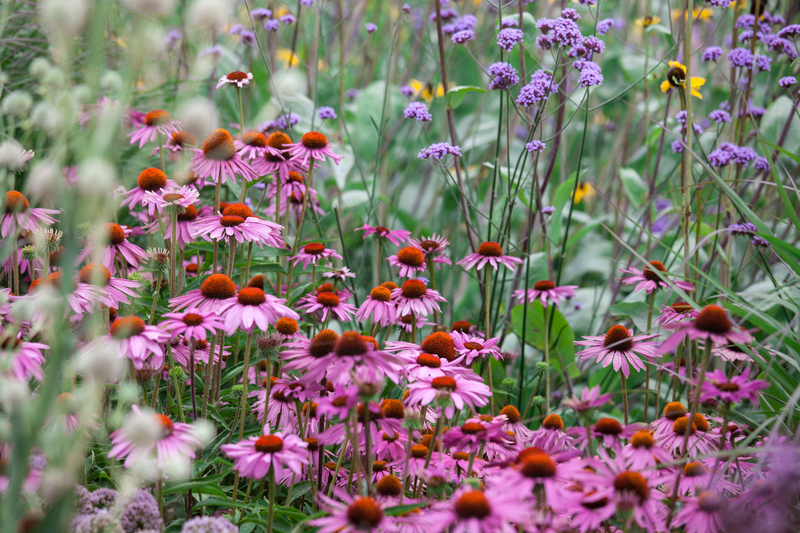Immerse yourself in serenity with these Zen garden tips
Posted on 17/09/2025
Immerse Yourself in Serenity with These Zen Garden Tips
Looking for a way to bring tranquility and mindfulness into your everyday life? Designing a Zen garden at home is one of the most effective practices to experience peace, inner calm, and reconnect with nature. Throughout this article, you'll discover the most powerful Zen garden tips and expert advice to help you cultivate a haven of serenity right in your own yard or even indoors. Whether you have a sprawling landscape or a compact apartment balcony, our comprehensive guide will walk you through the essentials of creating a Zen oasis tailored to your space and needs.

What is a Zen Garden?
A Zen garden, also known as a Japanese rock garden or karesansui, is a style of garden rooted in Japanese culture and Zen Buddhism. Characterized by minimalist design, raked gravel, sand, carefully placed rocks, and sometimes sparse greenery, these gardens evoke a profound sense of tranquil simplicity. Their primary purpose is to facilitate meditation, contemplation, and a feeling of harmony with the universe.
Key Elements of a Zen Garden
- Sand or Gravel: Symbolizes water, and is raked into patterns for meditative purposes.
- Rocks: Represent islands, mountains, or natural formations, arranged intentionally to suggest balance.
- Moss and Plants: Used sparingly to highlight simplicity and natural beauty.
- Ornaments: Lanterns, bridges, or statues may be included to reinforce peacefulness and symbolism.
Why Build a Zen Garden?
Before learning how to create your own Zen garden, it's important to understand the benefits:
- Mental Clarity: The act of arranging and tending to a Zen garden enhances focus, reduces anxiety, and cultivates mindfulness.
- Stress Relief: The tranquil ambiance, coupled with slow, deliberate actions like raking, can lower stress levels.
- Aesthetic Appeal: Adds minimalist elegance and sophistication to your home or yard.
- Low Maintenance: Compared to traditional gardens, Zen gardens require minimal care.
- Year-Round Enjoyment: They can be appreciated regardless of the season, as their essence remains unaffected by weather.
Essential Zen Garden Tips for Lasting Tranquility
1. Choose the Right Location
Select a spot that invites quiet reflection. It could be a corner in your backyard, a patio, a balcony, or even a windowsill for a mini Zen garden. Ensure the area is away from heavy foot traffic, loud noises, and distractions.
- Outdoor Spaces: Seek out shaded, secluded corners or spaces bordered by natural elements like trees or fences.
- Indoor Spaces: A tabletop or shelf near a window where you can access natural light works well.
Tip: Orient your garden towards a peaceful view or in a direction you naturally face during meditation.
2. Embrace Minimalism
The heart of a Zen rock garden lies in its simplicity. Too many elements can clutter your space and hinder the calming atmosphere. Select a handful of stones, a patch of sand or gravel, and limit plant varieties.
- Less is More: Stick to a neutral palette and allow breathing room between components.
- Avoid Overcrowding: Every rock and plant should serve a purpose and be placed with intention.
Remember, a sense of spaciousness is essential for a Zen landscape to impart its full restorative effect.
3. Select Natural Materials
Authenticity enhances serenity. Choose natural materials that weather gracefully and blend harmoniously with one another.
- Sand or Gravel: Choose fine, light-colored gravel, crushed granite, or white sand for easy raking.
- Stones: Source smooth river rocks or rugged boulders according to your preference.
- Wood Elements: Use unfinished timber for benches or bamboo for fences and accents.
Pro Tip: Avoid artificial materials or brightly colored stones. Their presence can detract from a genuine Zen ambiance.
4. Master the Art of Raking
Raking patterns into the sand or gravel is more than decoration; it is a soothing meditative exercise. Traditional Japanese Zen gardens feature circular, wavy, or straight line patterns that represent rippling water and movement.
- Mindful Practice: Use a wooden rake and focus your attention on each motion, treating it as a form of meditation.
- Experimentation: Try different designs--swirls, loops, chevrons--to see which best evokes calm and suits your mood.
Tip: Re-raking your Zen garden after wind or footsteps is a ritual that restores order and peace.
5. Arrange Rocks with Intention
Placing rocks purposefully is an art form in itself. They symbolize islands, mountains, or animals, and their arrangement is typically asymmetrical to reflect the organic randomness of nature.
- Odd Numbers: Arrange stones in groups of three, five, or seven for balance and interest.
- Vary Heights and Shapes: Use a combination of upright (standing) and recumbent (lying flat) stones for visual contrast.
- Anchor Corners: Place the largest, boldest stones at edges or near focal points.
Think of the rocks as the "bones" of your Japanese Zen garden, providing structure and enduring strength.
6. Integrate Moss and Simple Vegetation
While classic Zen gardens are renowned for their sparse plantings, a thoughtful touch of moss or greenery can inject vitality and color. The goal is subtlety--choose plants with gentle forms and muted tones.
- Moss: Offers lush contrast against rocks and sand, especially in shady or moist spots.
- Bamboo and Small Shrubs: Use sparingly along borders or to frame a view.
- Ground Covers: Japanese forest grass, mondo grass, or small ferns work beautifully.
*Avoid flowers and showy, complicated foliage--the emphasis should always be on balance, not distraction.*
7. Add Tranquil Ornaments and Features
A few well-chosen ornaments can amplify the serenity of your Zen space. Select features that evoke timelessness and spiritual reflection.
- Stone Lanterns (Ishidoro): Bring warmth and a glow to the garden at dusk.
- Water Basins (Tsukubai): Symbolize purity; even a dry bowl adds meaning.
- Benches: Provide a spot for meditation and contemplation.
- Bamboo Water Fountains: If space allows, the sound of trickling water enhances relaxation.
Remember: Zen gardens do not require elaborate decorations. Just a hint of symbolism is enough.
8. Create a Pathway for Mindful Movement
Paths encourage slow and thoughtful movement through your garden. Curved stone or gravel paths are preferred over straight lines, guiding your journey gently rather than dictating haste.
- Stepping Stones: Flat stones spaced for comfortable stride enhance the tactile experience.
- Gravel Paths: The gentle crunch of gravel underfoot deepens your sense of presence.
*Allow your garden path to meander--this is an invitation to slow down and observe each step with intention.*
DIY Mini Zen Gardens for Small Spaces
Not everyone has the luxury of a backyard, but Zen gardens can be beautifully adapted to small urban apartments, offices, or classrooms. A tabletop or tray-sized Zen garden can serve as a daily centering ritual.
- Materials: Use a shallow dish or tray, fine sand, a wooden rake, and a few small pebbles or crystals.
- Personalization: Add minor elements--a figurine, a feather, dried leaves--to make it uniquely yours.
- Mindful Pause: Take a few minutes each morning or afternoon to arrange or rake the sand, observing your breathing and inner thoughts.
These miniature Zen gardens are perfect for busy individuals seeking serenity at work or home.
Maintenance & Mindfulness Practices
Maintaining Serenity in Your Zen Retreat
- Regular Raking: Refreshes the gravel patterns and clears debris for maintained neatness and meaning.
- Weeding: Periodic removal of unwanted plants keeps the garden crisp and uncluttered.
- Stone and Ornament Cleaning: Wash rocks and ornaments gently with water to preserve their natural texture.
- Periodic Reflection: Reevaluate your layout every few months; rearrange elements to mirror changes in your inner journey.
Adopting your Zen garden as a living meditation tool--rather than a static piece of decor--enriches its value and keeps your experience fresh.
Zen Garden Design Inspirations and Ideas
Traditional Japanese Courtyard Gardens
Draw inspiration from temple courtyards, which often feature an open gravel field with sparse rocks and the soft whisper of bamboo. Recreate their serenity on a smaller scale by focusing on empty space as much as material objects.
Modern Minimalist Zen Gardens
Blend clean, geometric lines and a restrained color palette to create a contemporary twist on the classic Zen concept. Add a linear wooden deck, a white gravel bed, and a few sculptural boulders to balance modern and traditional aesthetics.
Nature-Infused Zen Oasis
Combine the wabi-sabi appreciation of imperfection with lush ferns, moss, and natural logs. Let native plants and ground covers spill gently over borders, capturing an organic, evolving serenity.
Indoor Zen Sanctuaries
Transform a sunlit corner or large windowsill into a contemplative haven. Place a sand tray, a few river stones, and a single potted bonsai on a low table. Add soft lighting, incense, or a small sound fountain for full sensory immersion.

Frequently Asked Questions
How big does my Zen garden need to be?
There are no size requirements--from a sprawling outdoor area to a small desk tray, it's the intention and care you invest that matter most. Let your available space and personal vision guide you.
Can I add water elements?
While traditional karesansui gardens symbolize water with gravel or sand rather than actual water, modern Zen spaces may incorporate shallow ponds, bamboo fountains, or basins to enhance ambiance. Just keep water features restrained and in harmony with the overall simplicity.
Do Zen gardens always use white gravel?
No. Soft gray, beige, or natural stone hues work beautifully as well. Choose a color that feels calming to you and complements your environment.
What plants are most suitable?
Stick with low-maintenance, shade-tolerant varieties such as moss, ferns, mondo grass, or Japanese forest grass. Avoid colorful blooms or sprawling shrubs to maintain a tranquil, understated effect.
Can children enjoy Zen gardens?
Absolutely! Mini Zen gardens help children practice patience and mindfulness. As a family activity, arranging rocks and raking patterns fosters creativity and calm.
Final Thoughts: Welcome Serenity Into Your Life
By applying these Zen garden tips, you open the door to daily peace and self-discovery. Cultivating a Zen space--whether vast or miniature--becomes a personal sanctuary amid life's chaos. Allow your garden to evolve with you, reflecting seasonal cycles and changes in your own inner landscape. With each rake of gravel, each deliberate placement of stone, and each moment spent in stillness, you draw closer to a profound sense of serenity.
Ready to begin? Gather your materials, set your intention, and turn your space into a tranquil refuge. Remember, the path to Zen is as meaningful as the destination itself. Immerse yourself fully, and let serenity flourish.
- Explore more Japanese garden inspiration for your home.
- Share your Zen creations on social media to inspire your friends and family.
Embrace the art of Zen gardening, and create a sanctuary of peace for yourself and others--one stone, one breath, one moment at a time.
Latest Posts
Key Gardening Tools Every Enthusiast Should Have
Reclaim Your Yard: Starting a Garden Makeover
Creating a Good-Natured Garden for Little Explorers

